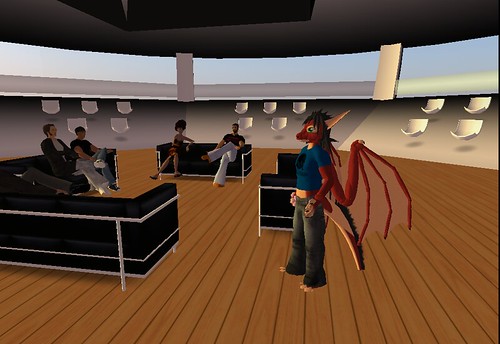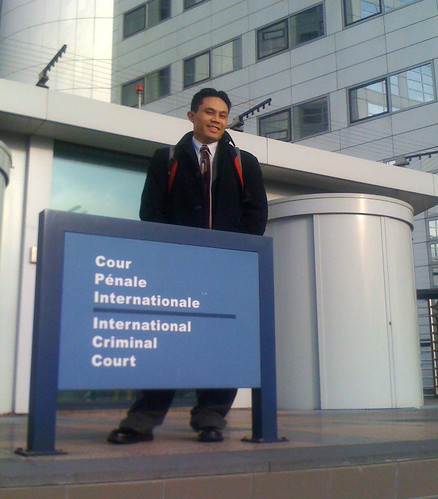I had the pleasure of speaking to my friend Josephine Dorado's class on "Collaboration in Networked Environments" that she is teaching at the New School this semester. The course apparently this week is exploring virtual worlds and MMOs, after delving into a range of other social media, from social networks to micro-blogging to mashup technologies. I got to speak to a class of about a ten or so graduate students, hanging out in a floating meeting space in Second Life.
For my topic, I decided to go back in time a decade or so and look at how civil society engagement in governmental processes has changed as communications technologies have evolved. It was a really useful personal / professional exploration for me to through as I prepared my talk for the class. Hopefully they found it somewhat useful themselves.
(As a side note, it's funny how natural it's getting for me to teleport
into a classroom or conference with my dragon avatar and just start
speaking and typing to other avatars.)
I began with my initial experiences as the communications coordinator at the fledgling NGO Coalition for the International Criminal Court back in the mid-90s. I described our initial forays into such esoteric technologies as gopher, email listservs, discussion board forums, newsgroups, and the early days of the "World Wide Web." And I talked about how instrumental our use of ICTs was in the successful completion of the treaty conference to create the International Criminal Court in Rome in the summer of 1998. (Here's a slightly more elaborate description of how the NGO Coalition used ICTs back in the day.)
Then I traveled forward to my work on as a civil society organizer for the UN World Summit on the Information Society from 1992-1995. Ostensibly about how the information communications technologies were changing the face of business, government, society, and culture, the great irony was how little of the conference proceedings and civil society activities actually used these technologies in innovative ways. Indeed there was a great tension between the established structure of NGOs with the UN system and the looser, more broad-based, technically-empowered e-activists.
Finally I talked about my work at Global Kids, particularly around civic engagement among both teens and adults using virtual worlds. The main focus was around the International Justice Center on the Main Grid, a virtual space and social network designed to support citizen engagement with the International Criminal Court and similar global justice issues.
The launch of the International Justice Center was a major event, taking place on March 20, 2008. The launch was planned to coincide with a MacArthur Foundation event at the Waldorf Astoria Hotel in New York City, where Kofi Annan was to receive a major human rights award. For the occasion, we organized a simulcast of Kofi Annan's speech into four virtual worlds and the web.
On that same day, I got to moderate a virtual discussion between Louis Moreno Ocampo, the lead prosecutor of the ICC, and Lloyd Axworthy, former foreign minister of Canada, who both appeared in Second Life as avatars. That was a very powerful and moving moment in my life as a civil society organizer.
While initially focused on just giving basic information about the ICC, and streaming events related to the ICC, the larger purpose of the International Justice Center is to allow groups and concerned individuals to use the virtual space of the Justice Center to gather, collaborate, organize and act in support of the ICC and global justice. As we enter into 2009, we hope to expand our reach to more non-profits to use the space for their own campaigns and outreach efforts.
I also described Global Kids work with teens around the 2008 presidential elections. We organized a couple of Teen Grid debate viewing parties, which allowed the teens to be among their peers as they listened / watched the presidential debates, discuss important issues among themselves, and have fun in the process. Then for election day itself, we organized our own mock presidential election, allowing our own teens to go through the voting process, no matter their age or where they were from.
I concluded that as these technologies get better and more broadbased, they are changing the nature of what it means to be an effective civil society organization, a citizen and government at all levels. These are exciting times to be doing this kind of work!




